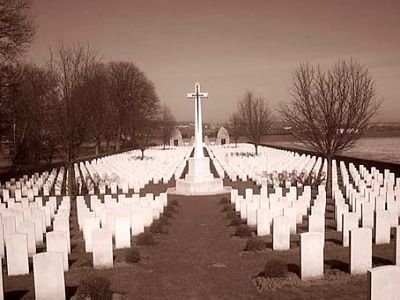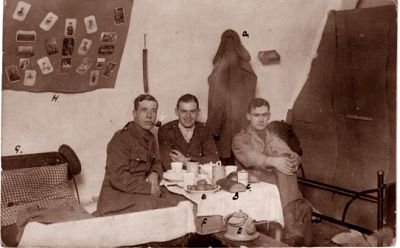 Germans tend a captured British Officer.
Germans tend a captured British Officer.
Picture courtesy of - "The Heritage of the Great War".].
|
It is generally reckoned that about one in eight captured men died as a POW.
All Nations were supposed to follow rules that had been laid down at the Hague concerning fair treatment of prisoners of
War. Men who were captured had a better survival rate that those who were not.
It is said that the efforts of the
International Red Cross and inspections by neutral nations created better conditions for POWs in the First World War than
for those in the Second.
Food parcels etc were regularly delivered.
There are no burials listed before May 1918 and many "missing" men must have fallen into enemy hands and presumably no
record made of their eventual deaths.
Many who surrendered on both sides were put to death on the spot, as
the Diary of the 4th Yorks Btn shows.
If you had just seen your best pal's brains being blown out, it must have been hard to find mercy for the perpetrator. A matter of luck, depending on which German Unit capture you.
On the other hand there are many examples of both sides caring for the enemy's wounded.
At the time of the War, stories of German mistreatment of prisoners abounded - punishing forced labour, placing prisoners in exposed positions to be shelled by their own side etc.
But there was much propaganda put about for obvious reasons.
After the Armistice British prisoners in German hands
were estimated to number 140,000 and they were released to make their own way back to Allied lines without any provisions.
Some died of exhaustion and and those who made it were said to resemble skeletons.
|
But towards the end of the War, the Germans probably had little to provide, as they were starving themselves.
Officers seem to have been generally treated well [see photograph below of Lt Thornton], while the experience of the other ranks was the opposite:-
Whitby Gazette.
13th December 1918, :-
A local soldier, who has been a prisoner of war in Germany since its commencement, in conversation with a friend yesterday, says that when the Germans had plenty of food they would not give it to the British prisoners, and that, if it had not been for the parcels sent to them by a generous public, there would have been no British prisoners left to come home to tell the tale.
The German Hospitals in 1914 and 1915 were not clean adn the food was not as ought to have been.
The reception hospital at Sennelager was in a filthy condition, owing to there being no means of keeping the place clean.
The treatment of British prisoners was in very, very many cases extremely brutal.
23rd December 1918:-
Pte Paul Marshall of the 4th Yorks Battalion, whose home is at Brotton, having recently arrived home from the Western Front, gives an interesting account of his experiences as a German prisoner of War.
He was captured in March this year and escaped from the German prison camp two days before the signing of the Armistice and made his way to Belgium.
Whilst in the hands of the Germans, he, with others, was for the greater part of the time employed just behind the German lines.
At one time he worked in the vicinity of Cambrai and for the last five months of his imprisonment he was at St Quentin.
His employment there consisted chiefly in smashing up new and good machinery, which the Germans had taken from factories and works in France.
The machinery was broken to pieces and thrown into scrap heaps. It was wanton destruction and they were compelled to do it.
Their food was of the coarsest kind, the bread being black and made chiefly of sawdust.
They were given no meat whatever, excepting an occasional taste of horse-flesh.
The hammers with which the machinery was broken weighed 21 pounds and in their weak state were almost more than the men could lift, yet they were forced to wield them.
For the first 3 days after being captured, the Germans did not give them a bite of food and they were almost dead with hunger.
Everything that they had in their possession was taken from them by the Germans and if they had had any rations the Germans would have robbed them of those also.
For the work behind the lines they were paid 3 pence per day and if they wanted to buy a cigarette they were charged 2 and a half pence for one.
Cigars were 10 pence and made from cabbage and other leaves.
At nights they slept in a large building, which he believed had been a French workhouse. They were fairly comfortable in the billet.
The following 68 men of the 4th Yorks Btn died in captivity and have known graves.
The first 24 men of the 4th Yorks Btn are buried at Niederzwehren Cemetery, all are recorded as having died in 1918.
201990 Pte Corps George. Home in Bradford Yorks. Born and enlisted at Bedale, N Yorks.
Died of wounds on the 16th of May.
|
 Niederzwehren Cemetery.
Niederzwehren Cemetery.
Situated about 10k South of Kassel, Germany it contains 1,796 Commonwealth burials.
Graves were brought in from many surrounding cemeteries after the War.
24 men of the 4th Yorks Btn are buried here.
|
203151 Pte Kane Francis, John. Home at - 24 Bristol St, Cargo Fleet, Middlesbrough,
place of birth and enlistment. Died on 4th July. Age 20. Of "Y" Company.
46698 Pte Sloan Mason. Born and enlisted at Sunderland, Co Durham. Died on the 29th July.
200592 L/Cpl Pearson Alfred. Home at Easingwold Yorks. Born at Crake and enlisted at Northallerton,
N Yorks. Died on the 14th August. Age 26.
4448 Pte Longbottom Edward. Born at Boothtown, Yorks and enlisted at Halifax, Yorks.
Died on 4th September.
235076 Pte Snart Frank. Home at Stamford, Lincs. Born at Bainton Northants. Enlisted at
Peterborough. Died on 15th September. Age 37.
30225 Pte Lowrey William. Born at Dalmuir, Dumbarton and enlisted at Newcastle upon Tyne.
Died on 18th September. Ex Northumberland Fusiliers.
21437 Pte Hornsby John, George. Born Stockton on Tees and enlisted at Middlesbrough, N Yorks.
Died 26th September.
203035 Pte Langridge George. Enlisted at Hownslow. Died 8th October.
|
 British Officers as POWs having Christmas dinner. Location unknown.
British Officers as POWs having Christmas dinner. Location unknown.
2Lt Wilf Thornton of the 4th Yorks
Battalion is in the centre.
He was taken prisoner on 21st March 1918, during the German "Michael" offensive on the Somme.
Wilf had risen through the ranks to be awarded a commission. He was one of three Darlington brothers who fought in the
First World War. In the Second World War he was commissioned into the Glosters. His brother, Pte Frank Thornton served with
the 4th Yorks and was killed on the 10th July 1916 at Kemmel. A third brother is believed to have served with the 4th Bn
before being transferred to the RASC.
[Photographs and information kindly contributed by John Sheen, author of Tyneside Irish, Durham Pals, & Wearside
Battalion.
John points out that conditions in an Officers' Camp, an "Oflager", were far better than those for other ranks.]
|
201197 Pte Barnett George. Home at - 5 Diamond Pl, Coldbath Rd, Harrogate Died
9th October. Age 23.
43730 Pte Beaver Charles, Thomas. Home at Glen Parva, Rutland. Born Oakham, Rutland.
Died 11 October. Ex 71383 87th T R Battn.
17456 L/Cpl Hunter William. Home at - Whittingham Alnwick Northumberland, place of birth and
enlistment. Died on 12 October.
35600 Pte Smith Walter, Frank. Home at Holypier Maidenhead, place of enlistment. Born
at Islington, London. Died on 12 October. Age 19.
235021 Pte Siddall William, Henry. Born and enlisted at Bridlington, Yorks. He was missing in action on 29th
May 1918 after the German offensive on the Aisne. It was his third time in France having been twice wounded whilts serving with the
Maxim Gun Section. He had enlisted in 1914 and gone to France with the Battn from the start. Prior to the War he was a painter for his
father and a member of the Life Saving Company. He owned and operated the pleasure Coble "Robert E Lee". Died
13 October 1918 at Quedlingburg. Age 27.
27239 Pte Raper Mark, Noulson. Born and enlisted at Flaxton York. Died 15 October.
Age 38.
207315 Pte Mitchell Bert. Born and enlisted at Northampton. Died 16 October.
Ex Northants Regt.
201195 Pte Daley John, D. Enlisted at Middlesbrough, N Yorks. Died 17 October.
Age 23.
|
34911 Pte Davies William. Home at Ogmore Cardiff, place of birth. Enlisted at Cardiff. Died
17 October.
201777 Pte Wildon Mark. Home at Northallerton. Enlisted at Middlesbrough, N Yorks.
Died 20 October.
21170 Pte Dalton Harold. Home at - 52 Salisbury St, Middlesbrough, N Yorks, place of birth
and enlistment. Died 22 October. Age 22.
Newspaper notice:-
DALTON - in kind remembrance of Pte Harold Dalton, 4th Yorks, 52 Salisbury St,
Taken prisoner May 27th, 1918. Died in German Hospital, October 22nd 1918. Ever
remembered by his sweetheart Nellie. Also Mrs Thomas and family.
In our home you are fondly remembered,
Sweet memories cling round your name.
True hearts that have always loved you,
Will love you in death just the same.
|
 Wilf Thornton described the items in the above picture in his own hand.
Wilf Thornton described the items in the above picture in his own hand.
|
41683 Pte Hartley Thomas. Home at - The Square, Backbarrow, Ulverston, Lancs, place of
enlistment. Born at Cartmel, Lancs. Died 27 October. Age 21. Ex Royal Field Artillery.
46536 Pte Larkin Alexander, Graham. Home at Felling Durham. Born at West Hartlepool
and enlisted at Gateshead, Co Durham. Died 4 November.
35576 Pte Kimmer Francis, J. Home at Silchester Hall Lodge, Mortimer, Berks. Little Bowden
Berks. Born Hickfield, Hants and enlisted at Reading, Berks. Died 6 November. Age 18.
35003 Pte Abrams Thomas. Born Runcorn Cheshire. Enlisted at Flint Wales Died 8 November.
Ex 44024 R Welch Fusiliers.
|
35144 Pte Gedney James, William. Home at Thorney Cambs. Born at Whaplode, Lincs
and enlisted at Wisbech. Died 8 December. Ex 9th T R Battn.
240578 Pte Daggitt G H. Died on the 1st November 1918.
|
|



